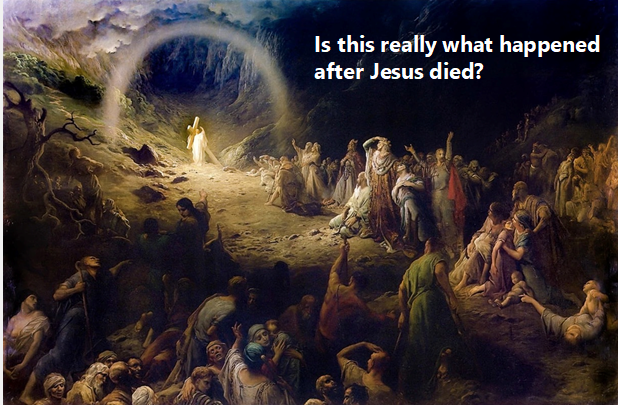(1 Peter 3:18-28) Doesn’t Peter Say That Jesus Went to Preach to the Spirits in Prison After His Death?
“For Christ also hath once suffered for sins, the just for the unjust, that he might bring us to God, being put to death in the flesh, but quickened [made alive] by the Spirit: By which also He went and preached unto the spirits in prison; Which sometime were disobedient, when once the longsuffering of God waited in the days of Noah, while the ark was a preparing, wherein few, that is, eight souls were saved by water.” (1 Peter 3:18-28)
 These verses are used by many to support their belief that after Jesus died, He went and preached to the lost souls, or wicked spirits, that were in some kind of purgatory or spirit world. Let’s begin by asking a few questions.
These verses are used by many to support their belief that after Jesus died, He went and preached to the lost souls, or wicked spirits, that were in some kind of purgatory or spirit world. Let’s begin by asking a few questions.
1. How did Jesus preach to those in prison? Peter says Jesus died in the flesh, but was “quickened [made alive] by the Spirit [God’s Holy Spirit]: by which [by which Spirit] He [Jesus] went and preached unto the spirits in prison.” So, Peter says Jesus went and preached to the spirits in prison by (or, through) God’s Holy Spirit.
2. When was the preaching done? Verse 20 says that Jesus, through the Holy Spirit, was preaching “in the days of Noah, while the ark was a preparing.” So, the preaching Jesus did through the Holy Spirit was at the time when Noah was building the ark.
3. To whom was the preaching done? Verse 19 says, “unto the spirits in prison.” The Greek word for “spirits” in this verse is πνεῦμα (pneuma) which means: “wind,” “spirit,” or “breath.” At the time of creation, God breathed His Spirit (or breath) in man’s nostrils and man “became a living soul” (Genesis 2:7). Not that mankind has a soul, but that mankind became a living soul. And because none of us are inherently immortal, and thus dependent upon God for life, “the soul [person] that sins shall die” (Ezekiel 18:4). Not that God kills the sinner, but that the unrepentant sinner will inherently face the natural consequence of stepping out from under God’s protective grace.
The Hebrew word for “soul” is נֶפֶשׁ (nephesh) which carries the meaning of “life,” “being,” “person,” as well as our desires, appetites or passions. The word refers to our whole being. In the New King James Version of the Bible, nephesh is translated as “being” in Genesis 2:7. It says, “man became a living being.”
Nephesh is also found in the following verse. See if you can pick out the word that the translators chose to use instead of the word “soul”:
“Your fathers went down to Egypt with seventy persons, and now the Lord your God has made you as the stars of heaven in multitude” (Deuteronomy 10:22)
Can you pick out the word? It’s the word “persons.” But remember, nephesh is often translated as “soul.” So, another translation of this verse might be “seventy souls.” Notice these alternate translations:
Brenton’s Septuagint Translation: “With seventy souls your fathers went down into Egypt; but the Lord thy God has made thee as the stars of heaven in multitude.”
Douay-Rheims Bible: In seventy souls thy fathers went down into Egypt: and behold now the Lord thy God hath multiplied thee as the stars of heaven.”
Smith's Literal Translation: With seventy souls thy fathers went down to Egypt; and now Jehovah set thee as the stain of the heavens for multitude.”
Darby Bible Translation: With seventy souls thy fathers went down into Egypt; and now Jehovah thy God hath made thee as the stars of heaven for multitude.
With this in mind, look at how the King James Translation writes out Genesis 12:5:
“And Abram took Sarai his wife, and Lot his brother's son, and all their substance that they had gathered, and the souls (nephesh) that they had gotten in Haran; and they went forth to go into the land of Canaan; and into the land of Canaan they came.”
Is this verse saying that Abram (later known as Abraham) and his family went into Canaan with “ghosts or disembodied spirits of the dead that they had gotten in Haran”? No, because “souls” means “people.” When Scripture uses the words, “my soul,” “your soul,” “his soul,” these are idioms for “me,” “you,” “him.” As we can see again, we do not possess a soul, we are souls!
At death, that spirit (or breath) of every person, good or bad, returns to God who dwells in heaven (Ecclesiastes 12:7). This is not saying that a conscious spirit or soul goes to heaven to mingle with past loved ones. If we are to believe that Peter is referring to souls or ghosts from people who have died, we must conclude that he refers to heaven as a prison. Since the spirit returns to God, then the “spirits in prison” must be in heaven where God is.
Therefore, we must conclude that these “spirits in prison” are not in heaven (or in a spirit world) but were alive at the time Jesus preached to them. Yes, Scripture uses the word “spirit” to refer to people who are alive:
“And they fell upon their faces, and said, O God, the God of the spirits of all flesh, shall one man sin, and wilt thou be wroth with all the congregation? … Let the LORD, the God of the spirits of all flesh, set a man over the congregation.” (Numbers 16:22; 27:16)
Notice how the Christian Standard Bible translates these verses:
“But Moses and Aaron fell facedown and said, ‘God, God who gives breath to all, when one man sins, will you vent your wrath on the whole community?’ … May the Lord, the God who gives breath to all, appoint a man over the community.”
In the book of Hebrews, we read:
“Furthermore we have had fathers of our flesh which corrected us, and we gave them reverence: shall we not much rather be in subjection unto the Father of spirits, and live? … But ye are come unto mount Zion, and unto the city of the living God, the heavenly Jerusalem, and to an innumerable company of angels, To the general assembly and church of the firstborn, which are written in heaven, and to God the Judge of all, and to the spirits of just men made perfect.” (Hebrews 12:9; 22, 23).
Some may object here and ask, “What about 1 Peter 4:6 where Peter says the gospel was preached to the dead?”
“For this cause was the gospel preached also to them that are dead, that they might be judged according to men in the flesh, but live according to God in the spirit.”
Peter is simply saying that the gospel was preached to those who are NOW dead. In the book of Hebrews, the author tells us: “For unto us was the gospel preached, as well as unto them: but the word preached did not profit them, not being mixed with faith in them that heard it” (Hebrews 4:2). He’s talking about the ancient Israelites. In the book of Galatians, Paul says that God “preached the gospel to Abraham beforehand” (Galatians 3:8). The gospel isn’t something new; it is an “everlasting gospel” (Revelation 14:6).
4. When were these “spirits in prison” alive? “... in the days of Noah, while the ark was a preparing.” Why does Peter refer to the people living during the time of Noah as being “spirits in prison”? Throughout Scripture we find this terminology to describe those who are captive to sin. David once said, “Bring my soul out of prison, that I may praise thy name” (Psalm 142:7). Notice that David’s soul was in prison while he was still physically alive. In the book of Isaiah, God calls the Gentiles (non-believers) “prisoners” because they sit in spiritual darkness:
“I the LORD have called thee [Son/Jesus] in righteousness, and will hold Thine hand, and will keep Thee, and give Thee for a covenant of the people, for a light of the Gentiles; To open the blind eyes, to bring out the prisoners from the prison, and them that sit in darkness out of the prison house.” (Isaiah 42:6, 7; see also Isaiah 61:1)
Paul referred to himself as one of those captives who was bound in sin when he wrote, “But I see another law in my members, warring against the law of my mind, and bringing me into captivity to the law of sin ...” (Romans 7:23). Jesus once said, “Whosoever committeth sin is the servant of sin … If the Son therefore shall make you free, ye shall be free indeed” (John 8:34, 36). Through Christ we will no longer be prisoners (or servants) of sin. Paul wrote that one of the most amazing promises of the gospel is that God will be “bringing into captivity every thought to the obedience of Christ” (2 Corinthians 10:5).
 We must therefore strongly reject the idea that, after His death, Jesus’ spirit went and preached to other spirits bound in some form of purgatory or spirit world. Instead, it was by His Holy Spirit (His very presence) that Jesus, through Noah, preached unto the non-believers (those who were captive in sin and unbelief) to repent and accept their salvation He so freely gives.
We must therefore strongly reject the idea that, after His death, Jesus’ spirit went and preached to other spirits bound in some form of purgatory or spirit world. Instead, it was by His Holy Spirit (His very presence) that Jesus, through Noah, preached unto the non-believers (those who were captive in sin and unbelief) to repent and accept their salvation He so freely gives.
Peter says that, during the time of when Christ’s Spirit was ministering through Noah to the “spirits in prison”, only “a few, that is, EIGHT SOULS, were saved by water” (1 Peter 3:20). Again, we see that the word “soul” refers to people who are alive! It was only Noah and his family, eight souls in all, who had faith in God to enter the ark and were saved from the flood. The Greek word for soul here is ψυχή (psuché) which can also mean “breath”, “spirit” or, “life” just like the word pneuma in verse 19 where Peter speaks of the “spirits” in prison. Therefore, we must conclude that, since the word “souls” in verse 20 refers to people who were alive, then the word “spirits” in verse 19 must also refer to people who were alive.




.jpg)
.jpg)
